2024年高考二轮复习英语专题突破题型六 读后续写 第二节 解题流程三步走 课件(共15张PPT)
文档属性
| 名称 | 2024年高考二轮复习英语专题突破题型六 读后续写 第二节 解题流程三步走 课件(共15张PPT) |  | |
| 格式 | pptx | ||
| 文件大小 | 491.5KB | ||
| 资源类型 | 教案 | ||
| 版本资源 | 通用版 | ||
| 科目 | 英语 | ||
| 更新时间 | 2024-04-17 22:34:34 | ||
图片预览


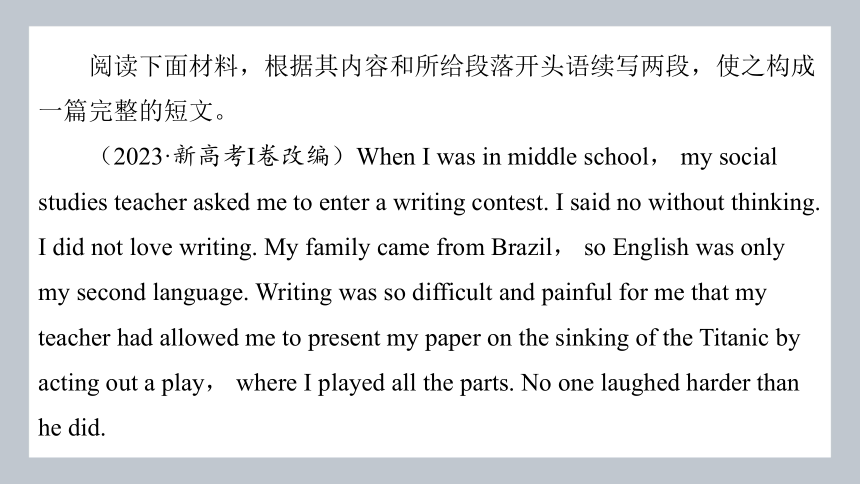
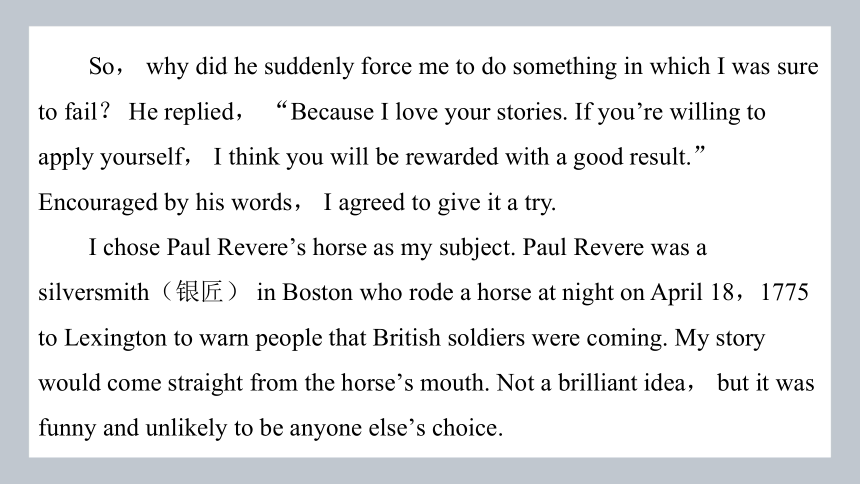
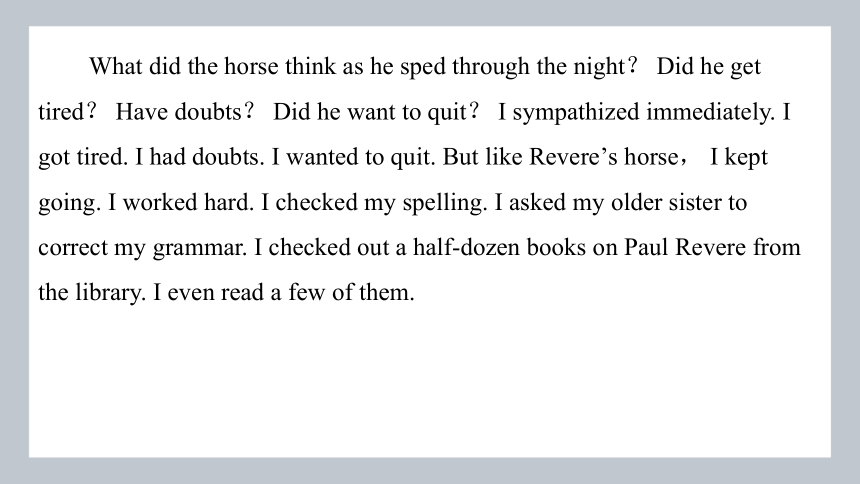
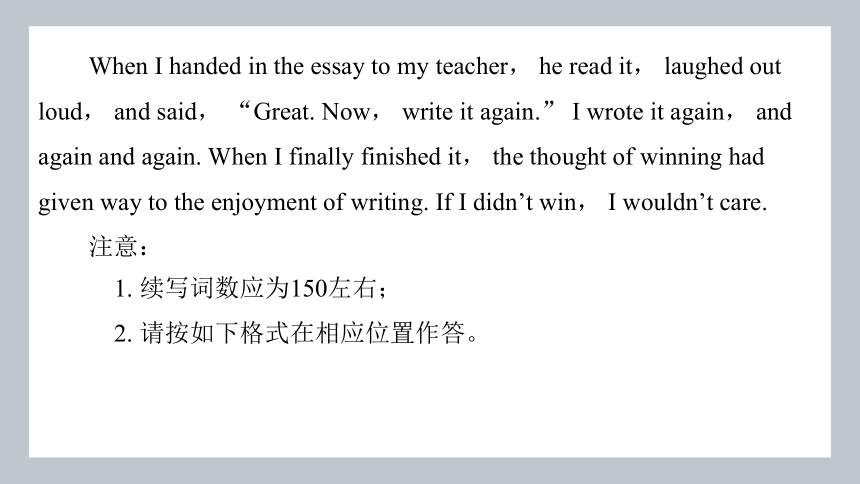
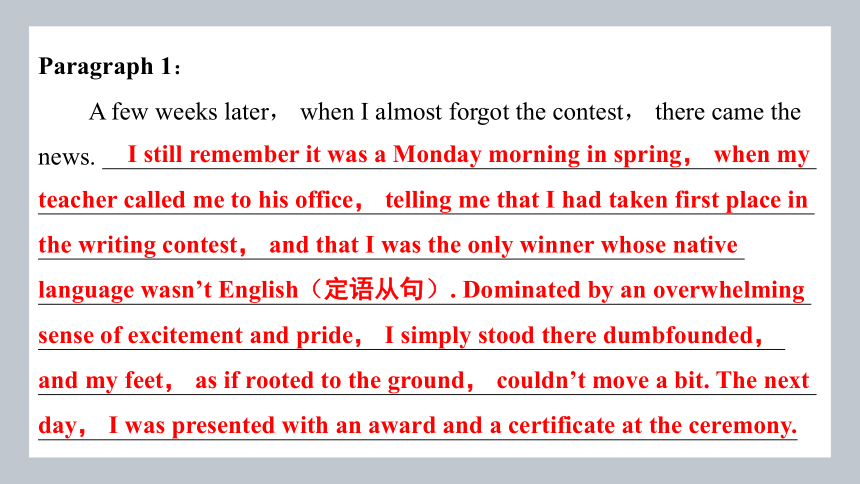
文档简介
(共15张PPT)
题型六 读后续写
第二节 解题流程三步走
阅读下面材料,根据其内容和所给段落开头语续写两段,使之构成
一篇完整的短文。
(2023·新高考Ⅰ卷改编)When I was in middle school, my social
studies teacher asked me to enter a writing contest. I said no without thinking.
I did not love writing. My family came from Brazil, so English was only
my second language. Writing was so difficult and painful for me that my
teacher had allowed me to present my paper on the sinking of the Titanic by
acting out a play, where I played all the parts. No one laughed harder than
he did.
So, why did he suddenly force me to do something in which I was sure
to fail? He replied, “Because I love your stories. If you’re willing to
apply yourself, I think you will be rewarded with a good result.”
Encouraged by his words, I agreed to give it a try.
I chose Paul Revere’s horse as my subject. Paul Revere was a
silversmith(银匠) in Boston who rode a horse at night on April 18,1775
to Lexington to warn people that British soldiers were coming. My story
would come straight from the horse’s mouth. Not a brilliant idea, but it was
funny and unlikely to be anyone else’s choice.
What did the horse think as he sped through the night? Did he get
tired? Have doubts? Did he want to quit? I sympathized immediately. I
got tired. I had doubts. I wanted to quit. But like Revere’s horse, I kept
going. I worked hard. I checked my spelling. I asked my older sister to
correct my grammar. I checked out a half-dozen books on Paul Revere from
the library. I even read a few of them.
When I handed in the essay to my teacher, he read it, laughed out
loud, and said, “Great. Now, write it again.” I wrote it again, and
again and again. When I finally finished it, the thought of winning had
given way to the enjoyment of writing. If I didn’t win, I wouldn’t care.
注意:
1. 续写词数应为150左右;
2. 请按如下格式在相应位置作答。
Paragraph 1:
A few weeks later, when I almost forgot the contest, there came the
news.
I still remember it was a Monday morning in spring, when my
teacher called me to his office, telling me that I had taken first place in
the writing contest, and that I was the only winner whose native
language wasn’t English(定语从句). Dominated by an overwhelming
sense of excitement and pride, I simply stood there dumbfounded,
and my feet, as if rooted to the ground, couldn’t move a bit. The next
day, I was presented with an award and a certificate at the ceremony.
Paragraph 2:
I went to my teacher’s office after the award presentation.
Giggling
instantly with a broad smile spreading on his face(with复合结构),
he told me that he was proud of my wonderful performance. It was at
that moment that a warm surge of streams washed through my body
(强调句), and the image of the horse emerged in my mind,
encouraging me to continue writing. Indeed, I got a taste of victory and
learned to pursue my dream with perseverance, whatever difficulties
might arise(让步状语从句).
一、 精读原文,理清脉络
原材料的故事情节是续写部分的“指南针”,指引着续写的方向,
因此我们必须认真阅读原文,厘清故事情节和脉络,这样才能在构思新
的情节时做到前后逻辑和内容上的高度衔接。
1 提炼六要素
时间(when in middle school)、地点(school)、人物(I、 my
teacher)、起因(I didn’t love writing but my teacher forced me to
participate in a writing contest.)、经过(I was hesitant, then felt
encouraged and became interested.)和结果(I won the writing contest.)。
2 审人称和时态
本篇读后续写是用第一人称来叙事的,所以续写内容也要以第一人
称为主;根据文章首句给出的时间背景When I was in middle school可
知,文章的基本时态是一般过去时,在续写时要沿用这一时态。
3 审故事主题
“我”来自巴西,以英语为第二语言,英语写作对“我”来说很困
难且让“我”感到痛苦,但在老师的鼓励下,“我”通过自己的努力赢
得了写作比赛,并体会到了写作的乐趣。故事给我们的启示是:只要努
力,即使在自己不擅长的领域也会有所收获;而且别人的欣赏和鼓励会
对自己产生积极的影响,对此我们要学会感恩。
4 审故事情节
主线(故事情节线):以时间顺序为发展脉络:“我”拒绝参加写
作比赛的原因是英语是“我”的第二语言,写作对“我”来说非常困
难,且让“我”感到痛苦→老师说喜欢“我”的故事,认为只要“我”
努力,就会有好的结果→受到鼓励,“我”同意参加比赛→“我”选好
故事主题,查阅资料,请姐姐帮忙,认真准备→“我”把写好的文章交
给老师→老师让“我”再写一遍→在一遍遍的修改中,“我”体会到了
写作的乐趣。
暗线(情感发展线):拒绝参加(difficult and painful)→受到鼓励
(encouraged、 agreed to give it a try)→积极准备,认真思考,求助他
人→努力创作→体会乐趣,放平心态(If I didn’t win, I wouldn’t care.)。
二、 细读首句,构思框架
审读第一段的开头句:几周之后,当“我”差不多忘了这次比赛
时,消息传来了。根据原文故事内容可知,“我”在准备比赛时非常努
力,老师严格要求,反复让“我”修改文章,所以“我”是有可能获奖
的。再根据第二段首句中的after the award presentation可知,几周之后的
消息是“我”获奖的消息。因此在第一段应该写“我”获奖以及获奖后
的心情:不敢相信、兴奋、激动、喜悦。而且这时“我”想到了鼓励、
帮助自己的老师。
审读第二段的开头句:颁奖典礼后,“我”去了老师的办公室。本
段可描写“我”对鼓励并帮助过自己的老师的感激,对老师表达自己的
感谢,而作为一名欣赏学生并严格要求学生的老师,他应该会更加欣赏
自己的学生,并进一步鼓励“我”相信自己,继续努力,以取得更大的
进步。“我”有可能从此爱上了写作。
三、 细节描写,修改润色
在精读文本、确定好思路、构思好情节之后,我们要下笔完成续写
任务,这时要认真研磨遣词造句,并对其进行修改润色。可以利用高级
词汇、特殊句式、修辞手法等对续写内容进行提升。比如描写“我”听
到获奖消息时的心情:
听到这个消息,我非常激动。
When I heard the news, I was very excited.(普通)
On hearing the news, I stood there, great excitement seizing
me.(高级)
题型六 读后续写
第二节 解题流程三步走
阅读下面材料,根据其内容和所给段落开头语续写两段,使之构成
一篇完整的短文。
(2023·新高考Ⅰ卷改编)When I was in middle school, my social
studies teacher asked me to enter a writing contest. I said no without thinking.
I did not love writing. My family came from Brazil, so English was only
my second language. Writing was so difficult and painful for me that my
teacher had allowed me to present my paper on the sinking of the Titanic by
acting out a play, where I played all the parts. No one laughed harder than
he did.
So, why did he suddenly force me to do something in which I was sure
to fail? He replied, “Because I love your stories. If you’re willing to
apply yourself, I think you will be rewarded with a good result.”
Encouraged by his words, I agreed to give it a try.
I chose Paul Revere’s horse as my subject. Paul Revere was a
silversmith(银匠) in Boston who rode a horse at night on April 18,1775
to Lexington to warn people that British soldiers were coming. My story
would come straight from the horse’s mouth. Not a brilliant idea, but it was
funny and unlikely to be anyone else’s choice.
What did the horse think as he sped through the night? Did he get
tired? Have doubts? Did he want to quit? I sympathized immediately. I
got tired. I had doubts. I wanted to quit. But like Revere’s horse, I kept
going. I worked hard. I checked my spelling. I asked my older sister to
correct my grammar. I checked out a half-dozen books on Paul Revere from
the library. I even read a few of them.
When I handed in the essay to my teacher, he read it, laughed out
loud, and said, “Great. Now, write it again.” I wrote it again, and
again and again. When I finally finished it, the thought of winning had
given way to the enjoyment of writing. If I didn’t win, I wouldn’t care.
注意:
1. 续写词数应为150左右;
2. 请按如下格式在相应位置作答。
Paragraph 1:
A few weeks later, when I almost forgot the contest, there came the
news.
I still remember it was a Monday morning in spring, when my
teacher called me to his office, telling me that I had taken first place in
the writing contest, and that I was the only winner whose native
language wasn’t English(定语从句). Dominated by an overwhelming
sense of excitement and pride, I simply stood there dumbfounded,
and my feet, as if rooted to the ground, couldn’t move a bit. The next
day, I was presented with an award and a certificate at the ceremony.
Paragraph 2:
I went to my teacher’s office after the award presentation.
Giggling
instantly with a broad smile spreading on his face(with复合结构),
he told me that he was proud of my wonderful performance. It was at
that moment that a warm surge of streams washed through my body
(强调句), and the image of the horse emerged in my mind,
encouraging me to continue writing. Indeed, I got a taste of victory and
learned to pursue my dream with perseverance, whatever difficulties
might arise(让步状语从句).
一、 精读原文,理清脉络
原材料的故事情节是续写部分的“指南针”,指引着续写的方向,
因此我们必须认真阅读原文,厘清故事情节和脉络,这样才能在构思新
的情节时做到前后逻辑和内容上的高度衔接。
1 提炼六要素
时间(when in middle school)、地点(school)、人物(I、 my
teacher)、起因(I didn’t love writing but my teacher forced me to
participate in a writing contest.)、经过(I was hesitant, then felt
encouraged and became interested.)和结果(I won the writing contest.)。
2 审人称和时态
本篇读后续写是用第一人称来叙事的,所以续写内容也要以第一人
称为主;根据文章首句给出的时间背景When I was in middle school可
知,文章的基本时态是一般过去时,在续写时要沿用这一时态。
3 审故事主题
“我”来自巴西,以英语为第二语言,英语写作对“我”来说很困
难且让“我”感到痛苦,但在老师的鼓励下,“我”通过自己的努力赢
得了写作比赛,并体会到了写作的乐趣。故事给我们的启示是:只要努
力,即使在自己不擅长的领域也会有所收获;而且别人的欣赏和鼓励会
对自己产生积极的影响,对此我们要学会感恩。
4 审故事情节
主线(故事情节线):以时间顺序为发展脉络:“我”拒绝参加写
作比赛的原因是英语是“我”的第二语言,写作对“我”来说非常困
难,且让“我”感到痛苦→老师说喜欢“我”的故事,认为只要“我”
努力,就会有好的结果→受到鼓励,“我”同意参加比赛→“我”选好
故事主题,查阅资料,请姐姐帮忙,认真准备→“我”把写好的文章交
给老师→老师让“我”再写一遍→在一遍遍的修改中,“我”体会到了
写作的乐趣。
暗线(情感发展线):拒绝参加(difficult and painful)→受到鼓励
(encouraged、 agreed to give it a try)→积极准备,认真思考,求助他
人→努力创作→体会乐趣,放平心态(If I didn’t win, I wouldn’t care.)。
二、 细读首句,构思框架
审读第一段的开头句:几周之后,当“我”差不多忘了这次比赛
时,消息传来了。根据原文故事内容可知,“我”在准备比赛时非常努
力,老师严格要求,反复让“我”修改文章,所以“我”是有可能获奖
的。再根据第二段首句中的after the award presentation可知,几周之后的
消息是“我”获奖的消息。因此在第一段应该写“我”获奖以及获奖后
的心情:不敢相信、兴奋、激动、喜悦。而且这时“我”想到了鼓励、
帮助自己的老师。
审读第二段的开头句:颁奖典礼后,“我”去了老师的办公室。本
段可描写“我”对鼓励并帮助过自己的老师的感激,对老师表达自己的
感谢,而作为一名欣赏学生并严格要求学生的老师,他应该会更加欣赏
自己的学生,并进一步鼓励“我”相信自己,继续努力,以取得更大的
进步。“我”有可能从此爱上了写作。
三、 细节描写,修改润色
在精读文本、确定好思路、构思好情节之后,我们要下笔完成续写
任务,这时要认真研磨遣词造句,并对其进行修改润色。可以利用高级
词汇、特殊句式、修辞手法等对续写内容进行提升。比如描写“我”听
到获奖消息时的心情:
听到这个消息,我非常激动。
When I heard the news, I was very excited.(普通)
On hearing the news, I stood there, great excitement seizing
me.(高级)
